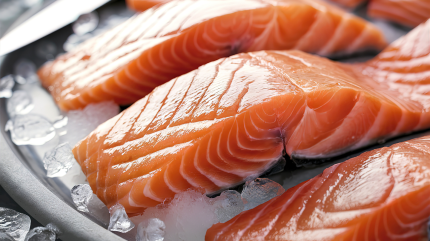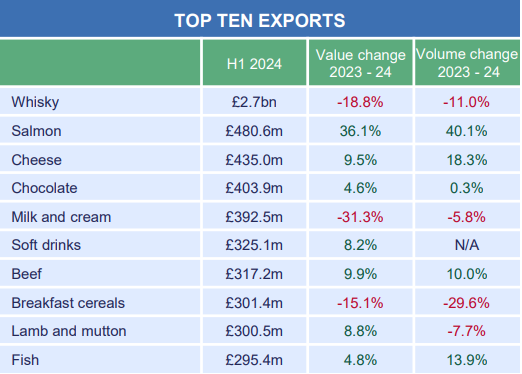
Food and beverage exports from the UK have dropped in the opening half of 2024 despite a jump in several products’ value sales.
Exports sank 6.1% in value compared to the first half of 2023, reaching £11.2bn ($14.9bn), according to a trade report from the Food and Drink Federation (FDF).

Discover B2B Marketing That Performs
Combine business intelligence and editorial excellence to reach engaged professionals across 36 leading media platforms.
Exports to the EU dipped 4.3% to £6.7bn, with volumes dropping by 23.6%. Meanwhile, non-EU exports fell 8.5% to £4.5bn.
However, several foods saw export values and volumes rise in the first six months of the year. The sales of salmon grew 36.1% in value to £480.6m.

Similarly, soft drinks rose 8.2% in value exports to £325.1m. The FDF said that Malaysia offers “significant new export opportunities, with tariffs on products like chocolate and soft drinks to be liberalised once Malaysia ratifies”.
Cheese, chocolate and beef all saw jumps in export value and volume too, but milk, cream and breakfast cereals suffered drops during the six-month period.

US Tariffs are shifting - will you react or anticipate?
Don’t let policy changes catch you off guard. Stay proactive with real-time data and expert analysis.
By GlobalDataWhisk(e)y exports drove the overall drop as they were down 18.8% in value terms, reaching £2.7bn, and 11% in volume terms. Last week, the Scotch Whisky Association (SWA) called for government support after the volume and value of exports both fell at a double-digit rate in the first half of the year.
The FDF reported that Ireland stood firm as the UK’s largest single export market, with a 1.1% rise to £2bn in the first half of the year. France, the US and the Netherlands came in next, as Dutch exports dropped 14.8% in value to £882.8m.
It said in the report: “The EU remains our largest trading partner; however, export volumes are down almost a quarter from last year. Certification requirements continue to be, by far, the biggest obstacle to growth.”
Imports to the UK grew 3.2% in value to £31.1bn in the first half of the year, as Morocco (29.4%), South Africa (24.0%), and New Zealand (22.8%) all saw the largest increases.
The FDF said: “Imports from both EU and non-EU markets continue to increase. However, the situation is fragile, with full controls not yet applied to all EU products and with check rates set to increase.”
With the aim of growing exports, the FDF is urging the UK government to drop “unnecessary regulations” like the ‘not for EU’ labelling, strengthen food security and diversify supply chains, among other things.
It added: “The UK will soon be joining CPTPP, a trade bloc of 11 countries. Exporters will now benefit from the choice of trading via the bloc or the existing bilateral agreements, with additional market access secured for a range of products. In the case of Malaysia, CPTPP represents a new opportunity, with no existing bilateral agreement in place.”



